Ultimate Van Conversion Buying Guide: Best vans to live in

As I'm looking for my own dream van to start my #vanlife, I've developed a coherent and sound system for evaluating vans (- yes, I know, it's sad, but I'm that sort of guy). I'm learning on the fly, but after checking out hundreds of vans, driving dozens of all sorts and types (really), and talking to vanlifers, mechanics, and enthusiasts, a couple of important points stuck with me.
And now it's time to share these points, simply because picking a van to live out of is a way more complex decision than I've ever imagined it to be beforehand. But to keep it sweet and simple:
What's the best van to live in? The best van to live in depends on your wishes, activities, and lifestyle. It also depends on the amount of work you want to do on the van, your budget, and the type of journey. The most important considerations are size and techical state. You need to make an inventory of your wishes and pick a van accordingly.
Below, I'll walk you through each step of the decision process.
In this article
In this article I'll go over all factors that go into buying the right van, and discuss them briefly. Hopefully it will trigger your own thought process. It has worked wonders for me.
Later on, I give examples of which vans best fit specific needs. After reading this post, you'll have plenty of food for thought and hopefully a solid idea of the van you're looking for. It's everything you need for making a smart buying decision.
As there are thousands of cargo van buying guides out there, I will primarily focus on some points that don't get enough attention, and that are specific for vanlifers.
This is somewhat of a moster read, so to make it easier on you I've added some sections. You can skip there immediately, or pick up where you've left.
- Things to consider when choosing a van
- Decisions you need to make
- What types of vans are there?
- Pros and cons of each van
- Buying tips
Quick summary of best vans:
- Best all-round van to live in: Promaster or Ducato
- Best van for living big or an office: Mercedes Vario's or TN1 (508/407)
- Best van for mobile living and quick travelling: Euro Cargo vans - Sprinter, Promaster, Transit
- Best van for cheap maintenance: US Cargo vans - Chevy Express, Dodge Ram Van, GMC Savana
- Best van for easy maintenance: Classic vans - VW T1 t/m 3, Mercedes TN1 or Vario
- Best van for stealth camping (boondocking): Sprinter, Promaster, Transit
- Best van to live in pricewise: US Cargo van - Chevy Express, Dodge Ram Van, GMC Savana
- Best looking van to live in: Volkswagen T1, classic vans in general
- Most expensive van to live in: Mercedes Sprinter
The four stages of buying a van
There's four clear stages to choosing a van:
- Considering - Prioritizing your needs and wishes for the van
- Choosing - Narrowing it down and choosing the type or even model
- Selecting - Searching for solid options
- Buying - Buying the best one you can find and afford.
Some things to get out of the way before we get started:
- Maintanence-free vehicles do not exist. If you do manage to find one, please let me and the rest of the world know.
- You should definitely let a mechanic check out the car.
- Oh, did I say you should bring a mechanic?
1. Things to consider when choosing a van
There are a number of factors in determining what van to buy:
- Size
- Price
- Technical state - number of miles, age, servicing
- Complexity of mechanics - price of mainentance
- Availability - parts, info
- Mileage
- Safety - road safety and van security
- Looks
Why is size important?
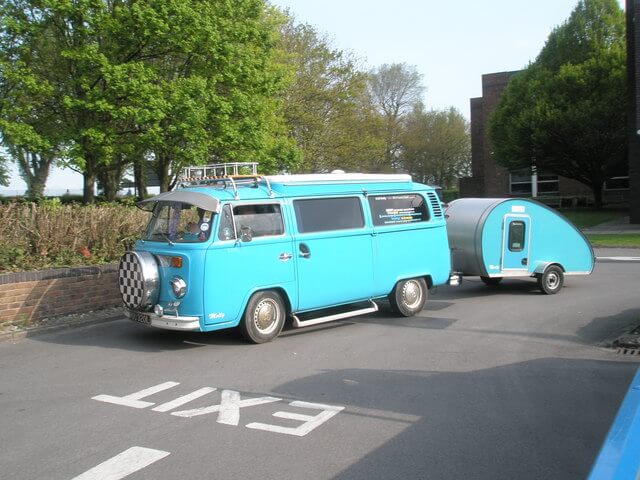
Allright, you have to consider a number of factors very carefully. The most important factor is definitely the dimensions of the van. Since you'll be living out of it, the things you do and want to do on a daily basis determine what van you should get.
Of course there are a number of other important factors, but you shouldn't underestimate the importance of size. Of all vanlifers I spoke to, literally all of them said that size is the number one issue. Whether it's an old van or a shiny new one doesn't really matter that much if it's too small, or too big (yes, too big can also be a problem).
All other factors are, in my opinion, way down on the list. The first three factors are size, size, and size.
Making an educated guess on what size you need can be difficult, especially if you don't yet know what dimensions suit what particular lifestyles.
The best way to get the size right, is to grab a floor plan of the models you like - and start sketching interiors. Ready to get going? Check out our ready-to-sketch floor plans.
Price
You should always buy the best you can afford, without overstretching yourself. Whatever number that is for you, is enterily up to you. But you get what you pay for. Now, in the internet age, there actually aren't a lot of people that don't know the value of what there offering. Mostly, if a vehicle is insanely cheap, there's something wrong with it.
So I operate on the baseline that there are no bargains and that I should accept to pay whatever's the value of the car. If you're planning on buying a $10,000 car, you should prepare yourself to spend the money.
Also, it's a good idea to take the first two years of maintenance into account. I like to set aside a decent amount (around $3,000) and consider this as part of the buying price.
I just set a number and stick to it. My number is sacred, I won't make any exceptions. I found this to be good general life advice to ensure I sleep sound at night.
Technical state
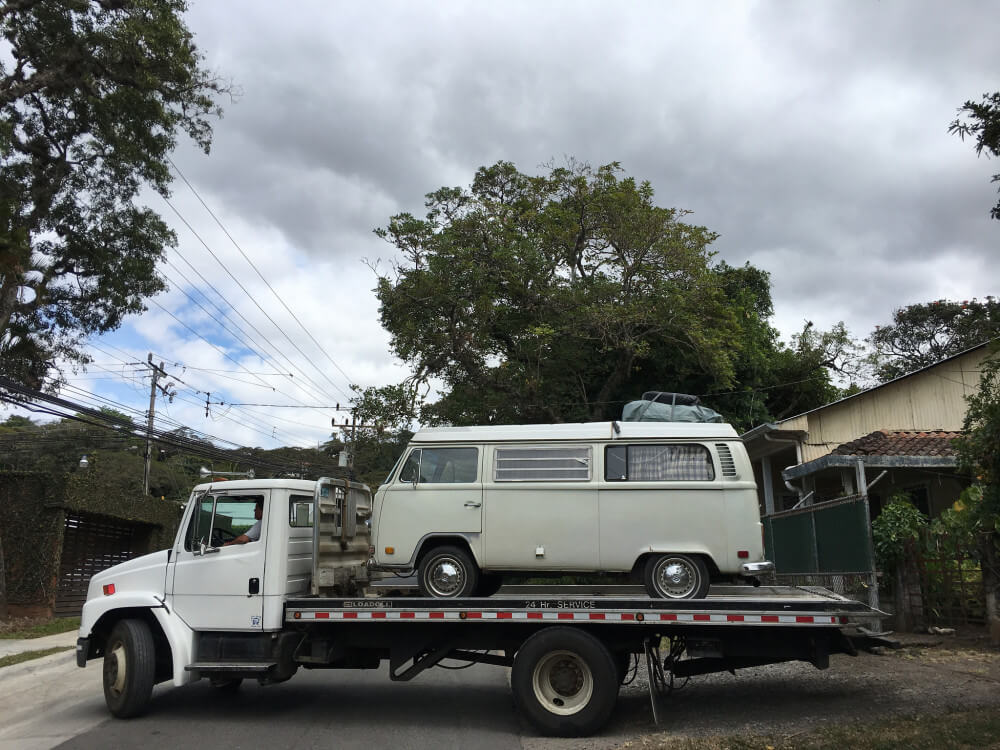
Number of miles
The amount of miles a car has done is a great indication for the amount of maintaince it will probably need. But it's no holy number. Some cars can take a lot of miles before anything needs replacing. Also, the amount of service and oil changes drastically influence the technical state of the car.
I'll always prefer a vehicle that's well serviced over a low amount of miles.
Generally, the number of miles tell you the following:
- Petrol cars will start to fall apart at 250.000 km
- Gasoline cars will start to fall apart at 300.000 - 500.000 km
- Manual transmissions need replacing after 400.000 km
- Rubbers, suspension, etc. will need replacing after about 15 years
Age
We'll come back to age in a minute. Like the number of miles, old age isn't always a bad thing. It can be cheaper and easier to maintain, more predictable and reliable (Daimler-Mercedes has a notoriously reliable OM314 and OM616 engines, which you'll find in the TN T1 and TN T2, and Varios).
Servicing
The amount of service is way more important than the number of miles on a car. Unfortunately, it's more difficult to check on the state of the engine. In the buying segment of this guide, I'll show you a couple of neat tricks to get a general feel of the mechanical state of the car.
If the car has been properly maintained (regular oil changes, every 15,000 - 30,000 km), the mechanical state can be very good, even on very old cars.
Old emergency vehicles, busses, etc. are mostly very well maintained (and have low mileage as well). I've seen German firefighter trucks of 40 years old with just 50.000 km and an almost new engine!
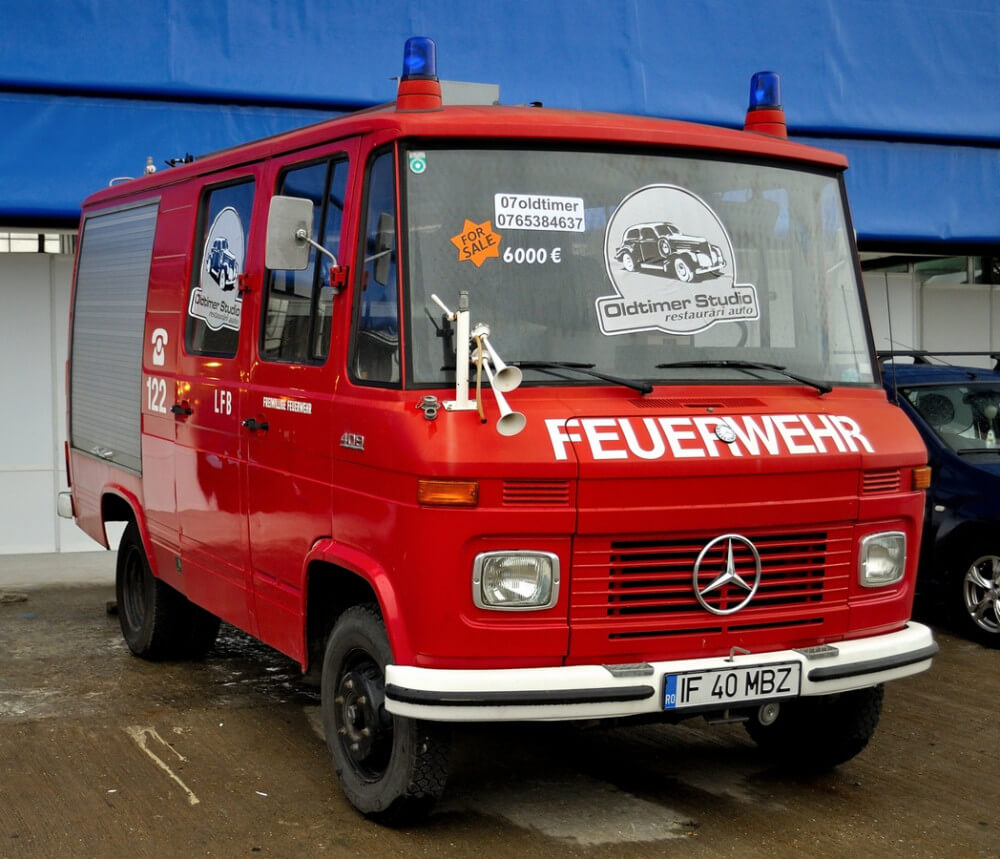
Complexity of mechanics
This is a pretty important factor. Before buying any car I want to have a general sense of how complex the mechanics are. This way I can make an educated guess on how my maintenance will work out over time. Are you gonna maintain the van yourself?
I don't have the skills to work on very complex cars, which means that if I buy a complex car, I'll have to calculate hourly garage fees for maintenance.
Also, some cars have notorious electrical systems, meaning only certified dealers will consider working on them. Dealer fees are about 5x higher than an indie garage. Also, some parts of the world don't have dealers. So if you want to go to Mexico, maybe buy an older van, and not the high-tec 2018 Sprinter.
An example are Mercedes Sprinters from 2006 onwards. They have a new electrical emission system (called DPF), which requires a specialized computer that only dealers have.
A good rule of thumb is that all cars before 2000 have little to no electronics, making them easier to maintain yourself.
Availability
Where and when you live determines the availability of the model you're looking for. Why is this important? Because supply and demand. If your model isn't widely available, you gotta be prepared to pay a little extra.
Also it's important to consider what the availability of parts is. Some popular models have plenty of spare parts available, and if there's a large aftermarket, your maintenance will be a lot cheaper.
Please note that an older car doesn't automatically mean fewer parts available. Some older vans, like (again - I think they're just great) the Mercedes TN T1 and T2 (407, 508, etc.) were build for decades and widely popular, were mostly maintained properly by professional firefighters and so on. This means there are plenty of engines, transmissions, and so on available.
The same goes for information. If you're going to maintain the van yourself, it's important there are good resources available, like technical manuals, or a good community (message boards) where you can go and ask questions.
Mileage
The importance of good mileage depends on how much you're planning to drive, the price of fuel (it's cheaper in the U.S. than in Europe), and the amount you're willing to spend. In my opinion, it's less important than most people think. An older car with bad mileage gives me plenty of other advantages, which I will get into later on.
Safety
There are two types of safety to consider. Number one is road safety - meaning: how likely am I to die if I get in an accident with this thing? Number two is safety from break-ins or van security.
Road safety
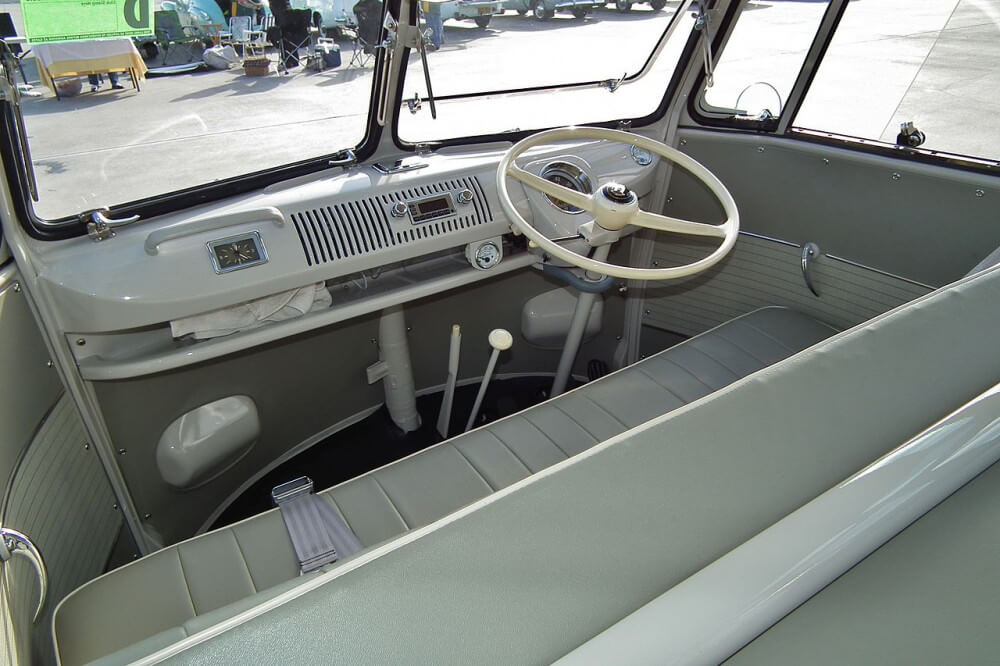
Old cars are less safe than new cars. They don't have airbags or crumple zones. Or even no seat belts (which is insane!). Getting in an accident with an old car is way more dangerous than in a modern car. So you have to consider how important safety is for you.
In some cars, you can add some safety features yourself, so check for availability beforehand.
Van security
In general, older vans are easier to steal, break open, or vandalize. The upside is: it's an old van! So the paint job probably isn't pristine. So a little extra scratch won't matter as much.
Also, you can add some security features yourself, such as additional locks on the doors. These things make it way more difficult to break into your van, so they are well worth there money. There's also the high-end anti-theft systems, like Bearlock. These things are great. If you get one of these, the thief will have to steal the van driving backwards. So let them have a go at that.
Looks
There's a reason this ones at the bottom. It's just not as important as all the other things. I don't mean that it's not important; it's just not as important. I myself find the looks of things hugely important, but bad looks don't give you trouble sleeping or headaches, and van security, financial worry, or seemingly unsolvable mechanical issues do.
So for the sake of my own health and that of my surroundings, I prefer to buy something nice, but not if it's not all of the above first.
Secondly: changing the look on a van isn't that hard or expensive. You can pretty easily change the color (about $1,000 if you put in a bit of work), the bumpers, grille; you can add chrome bars, spoilers, roof racks, and all that jazz.
But you can't change the size! (Well, actually you can, but it's a lot of work, and afterwards, you still have to paint the damn thing). So go for the right size, and then make it pretty!
2. Choosing a van
So we take all of our considerations and try to find the right type of van, and then narrow it down to a specific model or pool of models.
- What do I want and what do I want most?
- What type of van is most likely to meet those wishes?
- What brand and model offers best value for money for my specific needs?
Decisions you need to make
We've considered all the factors that go into making an informed decision. Now we need to prioritize and stick to our priorities. By this I don't mean 'set them in stone'; they can change when you gain more knowledge or information, but you shouldn't go against your own priorities without careful consideration.
So how to do it? Well, it depends. I always start by trying to map out what things I'll do most in the van, and put them in order. This gives me a general sense of what I'll need. In my case, I start with these questions:
What type of journey am I going to make?
Surroundings are key in choosing your van. Where will you go?
- Is it cold or hot where you're going? - A lot of sun, or very dark?
- Is it humid there? Better not buy a van that's notorious for rust. Mercedes comes to mind.
- Are you going to primarily do off-road or high way? Don't buy low or very heavy vehicles.
- Do you want to go stealth or not?
- Are you going to do a lot of miles, or are you going to slow travel?
- Where will you be staying? Ie. Do you need to park the van in large cities? Do you need to be able to park indoors in parking garages (in that case, size is very important)? If you're planning on city-hopping on the Old Continent (Europe), better not buy a large van. Towns are small there.

What am I going to do in the van?
- Are you mostly going to drive, or are you mostly going to live in the van?
What kind of maintenance am I willing to do and in what way will I do it?
- Maintain it yourself? Go with older vans
- Don't want to do a lot of work? Get a Sprinter
Things to consider when choosing age
- What is more important? Living or driving?
If you'll be driving the greater part of your time, then you might want to have a more comfortable and quiet drive.
You'll defnitely want better mileage, so you should probably check out newer cars. - If living is more important, and you'll slow travel for example, an old car can be great. Taxes are cheaper in some countries, and insurance as well.
Things to consider when picking size
- Will I maintain the van myself?
- Will I live inside the van most of the time?
- Will I work inside the van (office/desk job)?
- How important is cooking?
- How much security do I want (in terms of burglars)?
- How much security do I want (in terms of maintenance)
- How are you going to build the van? (Going to use a kit? > Choose a compatible van!)
- What facilities will I need?
- Do you need a desk? - does it need to be fixed?
- Do you need a kitchen?
- Do you need a bathroom?
What kind of technical specs and features do I need?
- Do I want rear-wheel drive or front-wheel drive? I've recently gone into depth on why most trucks have rear-wheel drive, and why you might want it.
- What type of fuel do I want?
- Do I need air conditioning?
- Do I need power steering?
Stealth camping or not?
I know, everyone wants a stealthy van. And I understand, I was inclined to go for a gangster Sprinter van myself, completely isolate myself from the world, and live for free from now on.
But there's an interesting argument to be made for not doing a stealth camper. I've read this discussion on Reddit, and the guy made an argument that after both living in the stealth van and the classic camper van, he noticed he got into a lot more trouble in the stealth van.
The reason for this is that the 'white van on the corner of the block' is just creepy. It's true, people won't know you're sleeping in there, but they also don't know what you are doing. Could be anything, really. Stake out? FBI? I guess someone who's being all secretive about their intentions just doesn't give off a good vibe.
He talked to a local cop, who said that if you're just outright boondocking in the open, and are honest about it, he won't have any problems with it; whereas with the creepy Sprinter, he will most definitely come and check you out.
So if you're not planning on doing loads of urban boondocking, maybe consider a cute Westfalia?
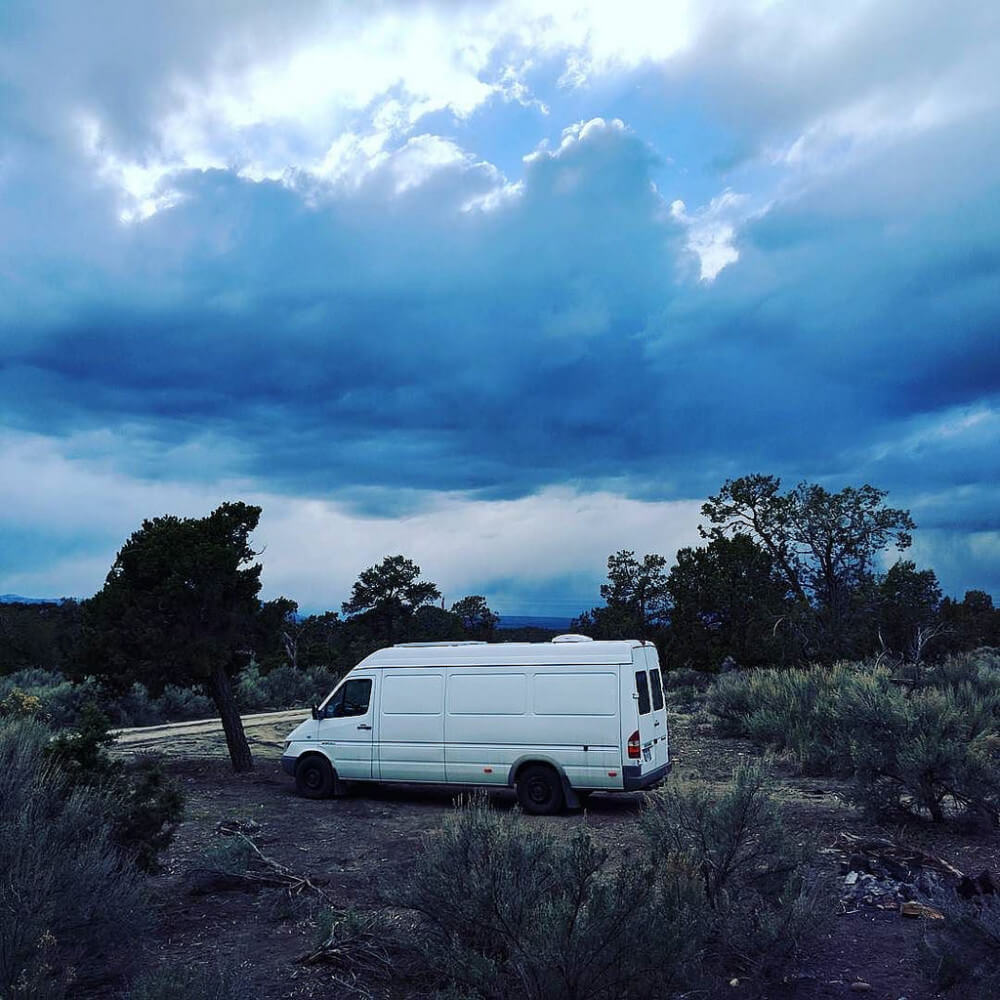
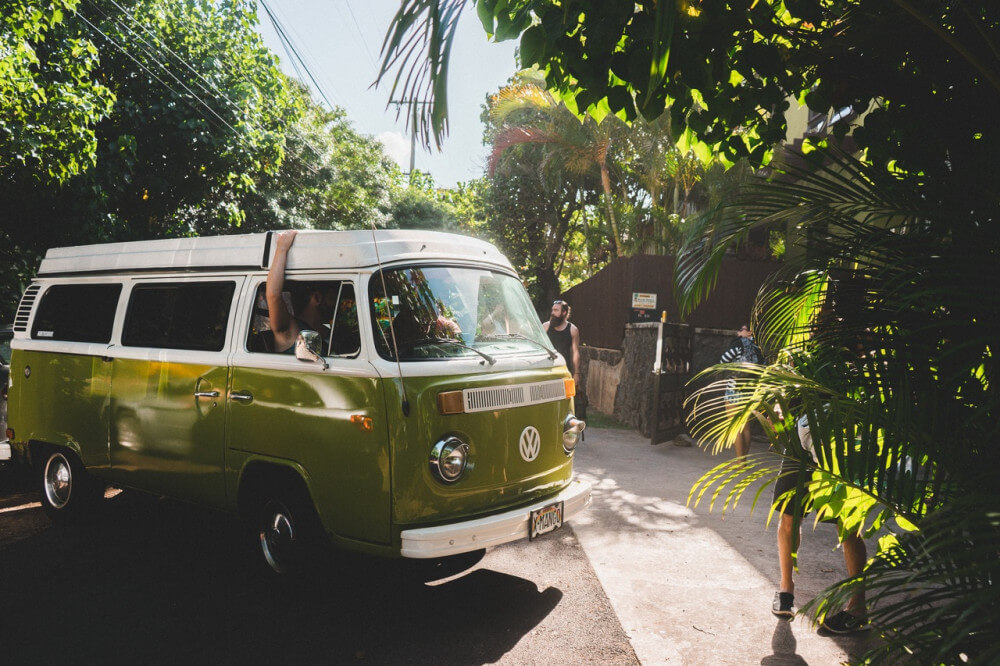
What types of vans are there?
So what's there to choose from anyway if doing a camper conversion?
- US Cargo or panel vans
- Conversion vans
- Euro Cargo vans
- Box or Luton van trucks
- Classic recreational vans
- Classic industrial vans
US Cargo vans
Examples: Dodge Ram Vans, Chevy Express, GMC Savana
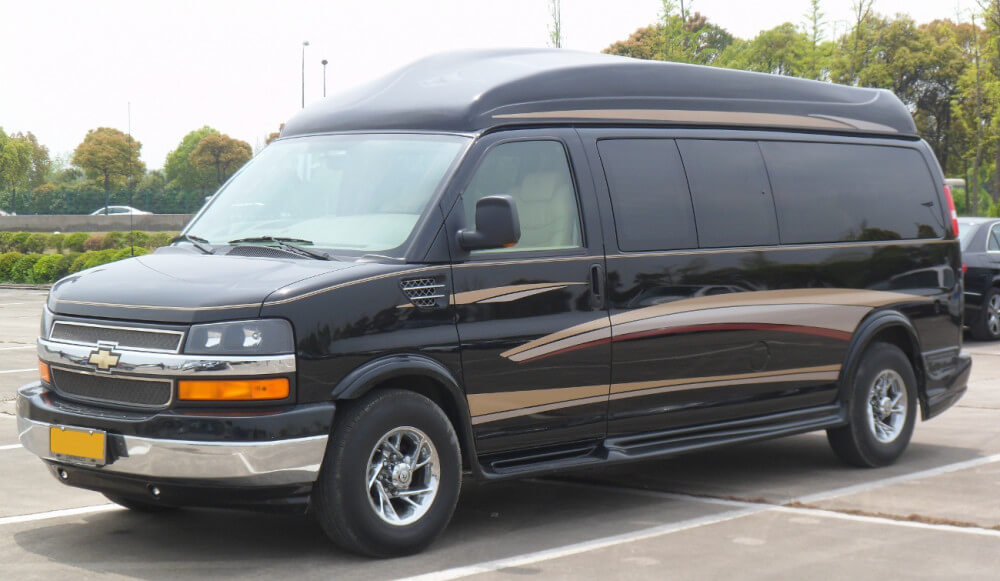
If you want to start from scratch, this is a great starting point. Cargo vans are widely available, because many professionals use them as fleet vehicles. You can get your hands on one for about $5,000. Because of availability, maintenance is cheap.
U.S. cargo vans are mostly build on a pick-up frame. This means that they are heavy duty, making them durable. There's a lot of parts available, since they share a lot of parts with pick up trucks
There are a lot of aftermarket parts and they're easy to work on yourself. Also, mostly all mechanics are able to work on them.
Conversion vans
Conversion vans are already upgraded in the factory. Generally this means that they have more windows, foldable seats, and extra storage. This can save you quite a lot of time when doing a build. They are a bit more expensive than cargo vans, and they aren't meant for full time living.
Euro Cargo vans
Examples: Mercedes Sprinter, RAM ProMaster, Ford Transit
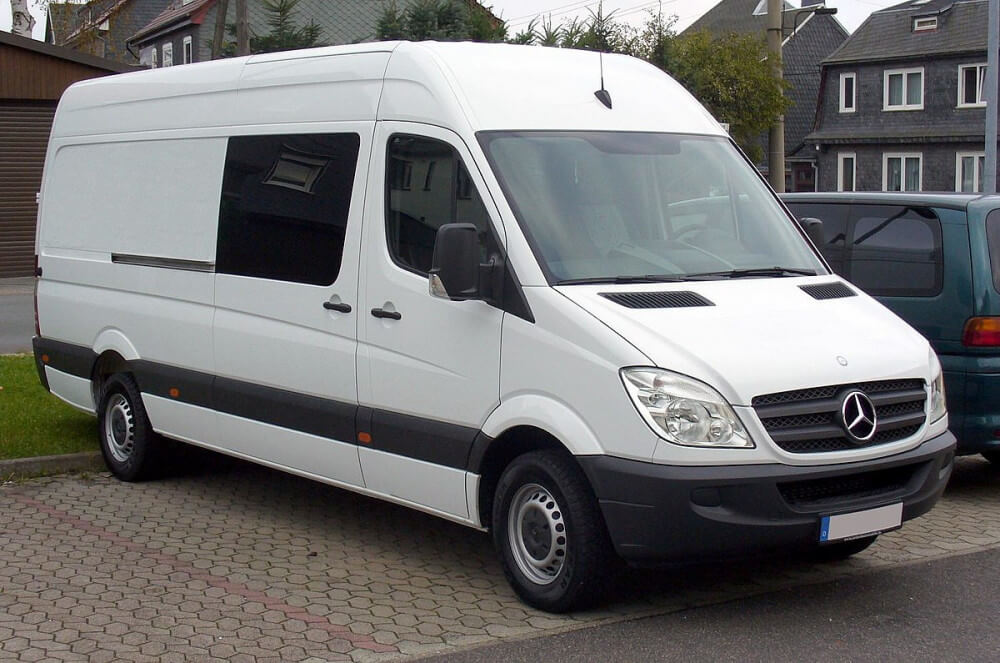
These are the panel vans from Europe. They are a bit different than the U.S. vans, since they're not based on a pick up chassis. They are widely available in the EU, but not so much in the U.S. They are about 3 times as expensive as regular cargo vans.
Maintenance is expensive, since they are complex; for certain maintenance you need to go to the dealer.
There are a lot of high top models available.
Box or Luton van trucks
Examples: 3.5 ton Luton Van
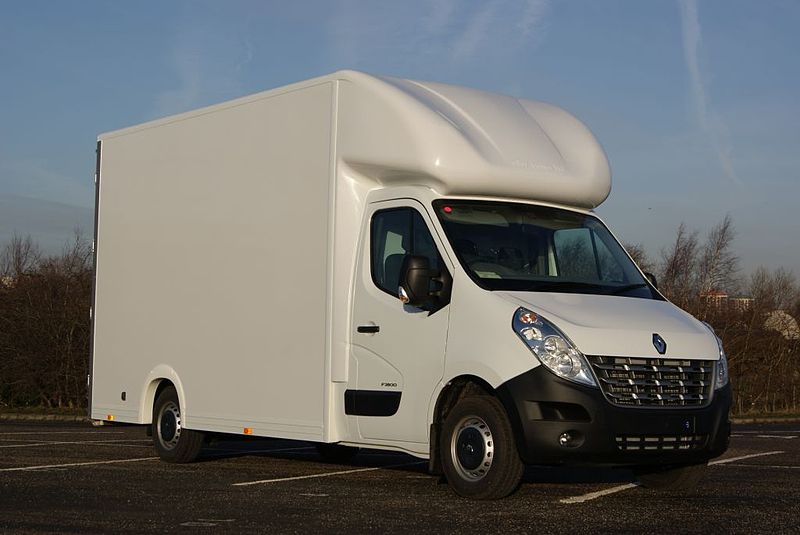
Box vans or Luton vans are a bit odd at first, but if you think about it, they're a practical van for conversion. The chassis, cabine, and engine is exactly the same as their cargo van siblings, though they have a box body mounted to the back frame.
These box body's are rectangular and wider than the cargo models, giving them a lot more floor surface. So you'll have plenty of more room to work with. Also, the straight walls make for easy insulating, and they offer loads of storage (most have a full bulkhead).
Best part is that you get more space without increasing the overall length of the van.
I haven't included them in the table since all parts are the same as that of cargo vans, except for size.
Classic recreational vans
Examples: VW Vanagon, VW T1
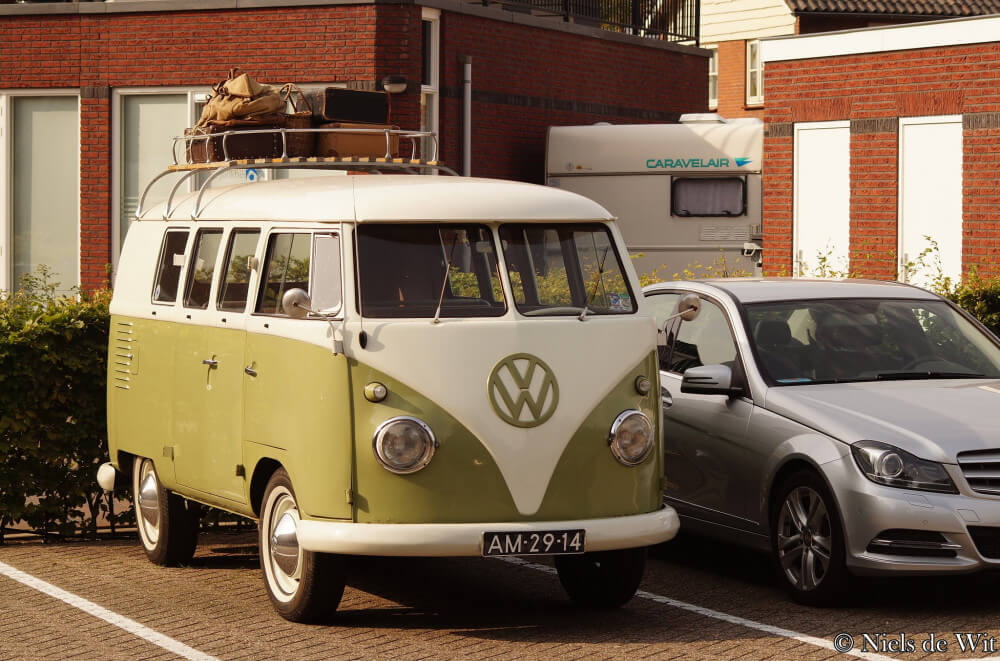
Recreational classic vans have a history as being the best weekend getaway vans. They're easy to maintain and use; they are small, so easy to handle; parts are reasonably available. Every mechanic can work on them, including you, if you're willing to put in the hours.
Maintenance is cheap, but it does require continuous work. They will break down all the time.
They are less readily available as some other vans, making them more expensive to purchase. Oh, and they look just amazing.
Classic industrial vans
Examples: Mercedes 407D, Mercedes 508D, Mercedes Vario
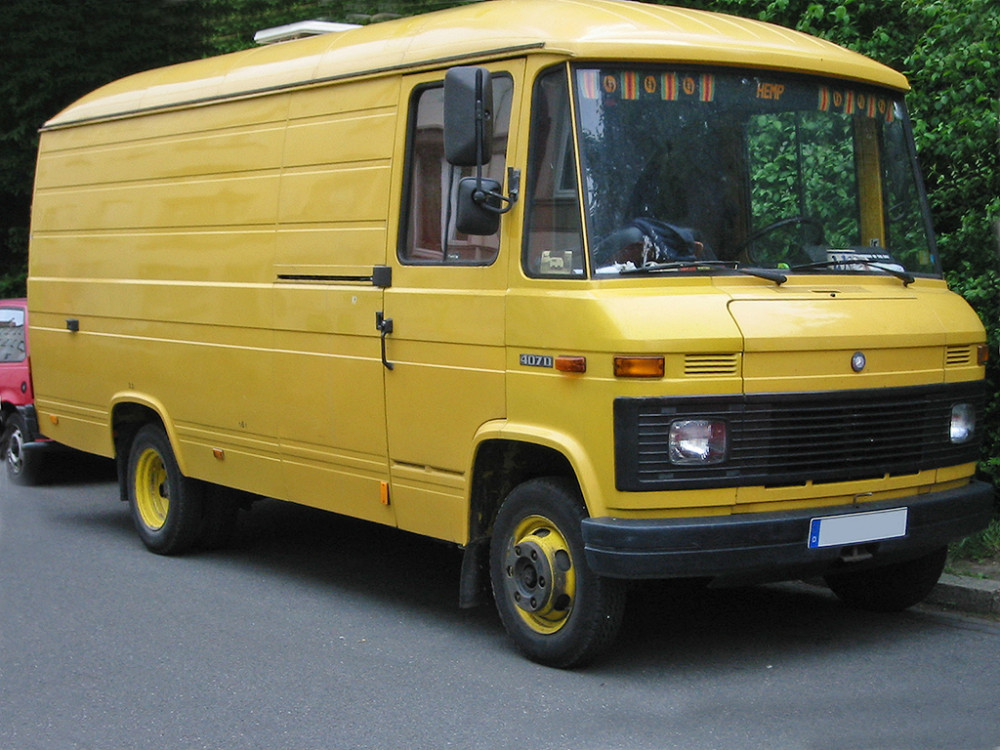
If you live in Europa it's quite easy to get your hands on an classic industrial van. These are just amazing conversions vans. They are very reliable, well-maintained, have a great cargo space which is boxy, and can carry heavy loads (making it less hard on the suspension to put in a wooden interior for example).
Also, classic utility vans are generally a bit wider than recreational or modern vans. About 5 - 10cm. This easily gives you up to 0.5m2 of additional floor space.
Parts are reasonably available in the EU, and they're easy to work on yourself. Also, every mechanic loves to work on these vans, as these are among the most reliable and easy engines ever build.
The best feature of these industrial vans is their engine: legend has it that these vans can do over a 1,000,000 km!
Complete summary of pros and cons per van
| Technical | Cargo & conversion | Euro van | Classic |
|---|---|---|---|
| Size | Not too big Cargo: not a lot of storage Conversion: a bit more storage Not a lot of floor surface & curved walls |
Euro: Can be pretty large Especially the 170" wheelbase Lot's of floor surface, curved walls Box: more space than you know what to do with |
Recreational: small, not a lot of storage Little floor surface & curved walls Industrial: large, plenty of storage A lot of floor surface Mostly straigt walls (boxy) |
| Price | Cheap | Expensive | Expensive |
| Technical state | Plenty of good vans available, thanks to commercial fleet use | Plenty of good vans available,thanks to commercial fleet use | You can find well-maintained ones |
| Maintenance | Cheap Mechanics not too complex Durable You can do your own maintenance All mechanics can work these |
Expensive Very complex mechanics Are notorious for failing electrical systems Not everyone can do their own maintenance Lot's of electrics involved Only dealers can work these |
Cheap Very simple Durable Easy to maintain yourself Need a lot of work All mechanics can work these |
| Availability | Widely available | US: not widely available EU: widely available |
Are less readily available |
| Parts | Parts are widely available Share a lot of parts with other vans Huge aftermarket for parts |
Parts are widely available, though not in remote places Large aftermarket |
Parts are mostly available |
| Mileage | Not the best | Very good | Terrible |
| Safety | Decent, if the van's not too old (> 1990) | Good | Terrible |
| Looks | Doesn't look very good | Euro: Looks great Box: Front looks as great, box van in forest looks odd |
Best looks you can get |
Narrow it down
Now we get into the elimination process. Yes, this is definitely my favorite part of any decision.
Pick your top two priorities, and find which vans suit them best based on the table above.
For example, my main priorities are size and low maintenance. The best picks for these two are
- size: Classic Industrial van
- low maintenance: US Cargo van
Now, some questions:
Old or new?
There are typically two large eliminating points in the decision of going classic or modern.
- The level of comfort you need. If this is above average, all classic and old cars are no longer an option.
- Your maintenance budget & method. If you want to do it yourself, definitely consider a classic car. If you don't want to do it yourself, but don't want to spend a lot, get a fairly simple car that isn't too old.
So now you know whether or not you will buy an old car, a new car, or an average car. Great. That narrows it down quite a lot.
4 Buying tips
I won't go into detail on the more basic buying tips, as there are many out there already doing a great job of summing up all the things you need to check (tires, suspension, damage, and so on). Instead, I will try to give you some new tips and a fresh perspective.
Engine health
The most expensive part of any car is the engine, which is why you want to make sure the engine is worthwhile. There
Basic buying tips
To give you a complete overview, these are the most important basic checks:
- Check for leakages in the engine compartment. With older engines, some oil is acceptable.
- Also check the oil cap. If there's a thick white substance in it, it's most likely an indication of a head gasket leak. You don't want that.
- Check the fluids: your oil should be at the proper level. If it's black, it's old oil, which is an indication that the owner doesn't maintain the car very well. Also check the coolant fluid (with a cold engine). The coolant should be a bright red, yellow, blue or green.
- Check how the car starts and runs, listen for a healthy engine sound. There shouldn't be any nocks, ticks, or clicks. Top tip: check the engine type on Youtube to listen to a healthy sound.
- Check if the chassis is straight, and if the engine is at a straight angle to the frame. If not, the car might've been in an accident.
- Check the state of the tires and suspension.
I recommend checking out this video by ChrisFix for a very good and in-depth explanation of what to look for when buying a used van or car:
Buying based on trust
Nobody can check inside the engine, not even mechanics. So buying a van is based on trust to at least some extent. You have to look the seller in the eye and check if you trust him or her. If you have terrible people skills, bring someone who can read people.
Don't be naive about it, but also don't ignore it if someone is telling the truth (which most people are most of the time).
Don't fall in love with a van you haven't driven yet
If you haven't driven it, you don't know it. You have no clue what's going on. Don't become invested in any vehicle before properly inspecting and test driving it. Be stoic about it, is my best advice.
Easily check the engine compression
You'll want to know how good the engine compression is. A simple DIY trick you can do on the spot, is opening the oil fill cap, and starting the engine. The more the cap bounces around, the worse the compression.
The following van is 11 years old and properly maintained. The compression of this engine is not great, but decent:
Did you find the answer to your specific question?
👍 38 👎 1
Are you looking for the dimensions of your van?
